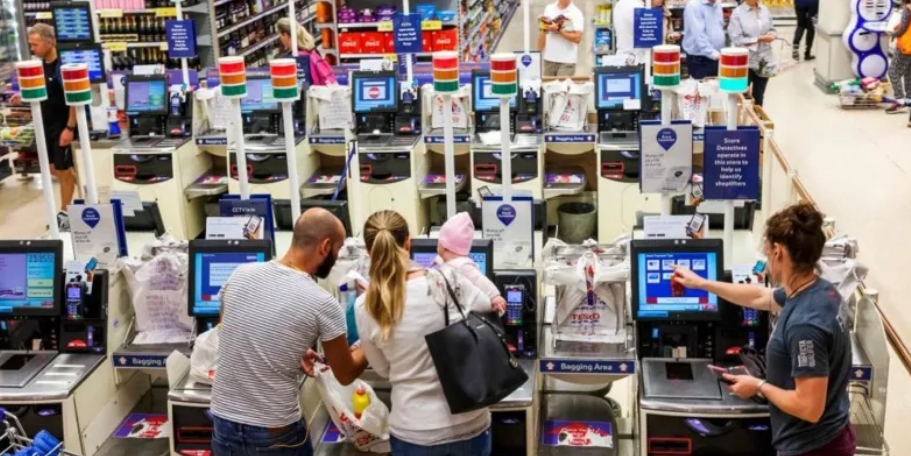Tesco’s latest attempt to curb shoplifting using artificial intelligence has sparked a mixture of amusement, outrage, and concern among customers after the retailer introduced surveillance-enhanced self-checkout systems in some of its stores.
The system uses overhead cameras and AI technology to detect when items have not been properly scanned. If a scan fails, a video replay appears on the checkout screen, showing the moment the item was missed, alongside a message instructing customers to “remove from bagging area and try again.”
The supermarket said the technology is designed to make the checkout process “quicker and easier” for customers. However, it declined to confirm how many stores are currently using the new system or which locations are part of the rollout.
Tesco’s move comes in response to a sharp rise in shoplifting across the UK. Police recorded over 516,000 shoplifting offences in England and Wales last year, a 20% increase from the previous year, according to the Office for National Statistics. Retailer estimates suggest the actual figure is significantly higher, with the British Retail Consortium reporting more than 20 million thefts in the 12 months to September 2024, costing businesses around £2 billion.
Reactions to the AI system have been swift. Social media users drew comparisons with football’s Video Assistant Referee (VAR), joking that the self-checkout now resembles a match replay. “VAR Decision – Tuna Disallowed,” read one viral Instagram comment, while another quipped, “Clearly offside.”
However, not everyone is laughing. Critics say the technology feels intrusive and raises serious questions about privacy and consent. “How on earth can the average person understand the extent of the tracking?” asked John O’Reilly, a game developer who noticed the new system in his local Tesco. “Are children even kept out of the dataset? Is my data being shared or sold?”
Tesco staff have expressed support for the new tools, saying they reduce the pressure on overstretched employees. One anonymous worker told the BBC they are often left to supervise 10 self-checkouts alone and regularly deal with customers trying to “con the system.”
Yet others feel the technology penalizes honest shoppers. Heather, 30, from Nottingham, said she finds the AI “too invasive,” adding: “If stores are so paranoid, maybe it’s time to bring back more staffed tills.”
The move follows similar steps by rival Sainsbury’s, which has also installed AI monitoring systems at self-checkouts. Meanwhile, Greggs has opted to relocate self-serve food items behind the counter at high-theft locations, and some supermarkets have begun tagging everyday goods like cheese and coffee.
As the debate grows, concerns persist that AI in retail could pave the way for broader surveillance in public spaces. “What’s next?” one user wrote online. “Drones to follow you about the store?”


